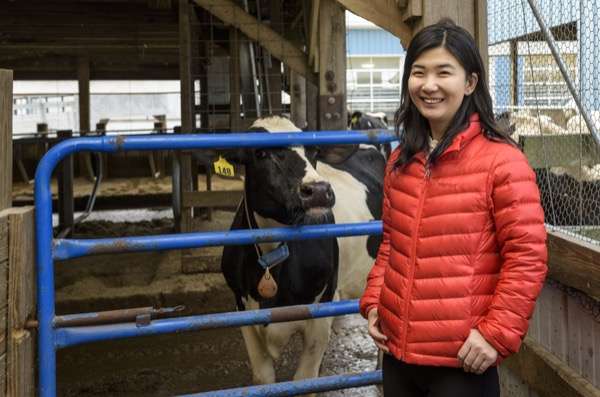Professor's research inspired by milk adulteration scandal in China

In 2008, thousands of children in China fell ill after drinking milk that had been adulterated with the chemical melamine.
This scandal inspired Liying Mu, University of Delaware assistant professor of operations management, to study ways to eliminate this dangerous and common problem.
"Milk adulteration, such as by adding water, detergent or starch to milk, has been widely reported in many developing countries," Mu said. "What are the reasons for those adulterations? And how can we solve the problem?"
In two papers published in top journals Management Science and Production and Operations Management, Mu's team found three key reasons behind the milk adulteration problem, as well as a number of creative solutions.
"We found out that small milk farmers at the first end of the supply chain are the mainly responsible parties for the adulteration," Mu said. "It begins in the source."
Small farm owners then supply their adulterated milk to rural collection stations, which sell the mixed milk to urban farms for processing. Farmers are able to get away with milk adulteration, Mu explained, due to the high cost of testing for milk quality.
"Imagine a very small milk collection station in a rural area," she said. "A station faces hundreds of small farmers, so it's not reasonable or feasible, even, for a station to test each individual farmer."
To combat this cost, milk collection stations use mixed testing, combining milk from many farmers and conducting only one test. But this, Mu said, increases the so-called "free-riding" phenomenon.
"In this case, farmers may adulterate milk to save their own production costs in the hope that others will supply high quality," Mu said.
The third problem, she continued, is an overall supply shortage of milk as population and demand grows. This means that milk collection stations compete with each other to entice farmers.
"Since milk prices are typically regulated in developing countries, stations will use testing to attract farmers," Mu said. "For example, stations can secretly reduce their testing standards to attract more farmers because supply is not plentiful."
These reasons combine to provide ample opportunity for milk adulteration. But how can this problem be solved without the expensive testing that collection stations cannot afford?
Mu's team suggested that collection stations implement a new kind of mixed testing that eliminates free-riding.
"We conquered the free-riding phenomenon by utilizing credible individual threat," Mu said.
In this model, stations first conduct a mixed test. If the quality of the mixed milk is not high enough, the stations will test each farmer individually.
"Those farmers who are detected to supply low-quality or adulterated milk will share the testing cost," Mu said. "So you have a threat to them."
The team's model also eliminates the third issue of harmful competition among collection stations and reverses the direction of competition to positive. This happens via a mechanism by which only the stations using the highest testing standards will be able to offer bonuses to farmers.
"This particular mechanism reverses the farmers' preferences," Mu said. "Then stations will compete by increasing their testing standards."
This solution, she explained, provides the greatest likelihood that high-quality milk will be produced while minimizing operator cost.
In this research, Mu is leading the fast-growing trend toward socially responsible operations management.
"Typically operations management cares about the profits of individual firms," Mu said. "Socially responsible operations management means that we also care about the affect of those individual firms on the population and society."
Journal information: Management Science
Provided by University of Delaware




















